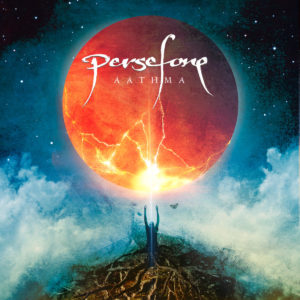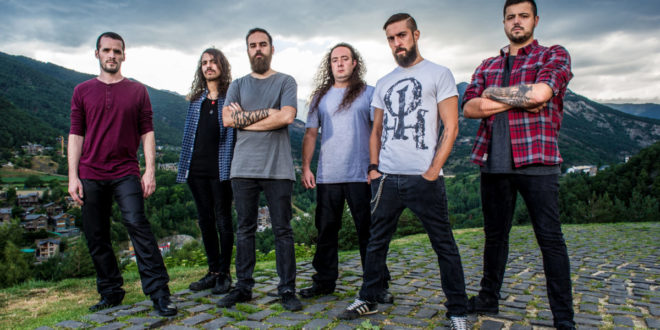 Persefone is a progressive metal band that you may not know of, hailing from a country that you’d be hard-pressed to locate on a map. So, why should you care? Well, for those with a proclivity for razor sharp musicianship, masterful progressive songwriting, or crystal clear production, Persefone’s upcoming album, Aathma, is huge. With this album, Persefone perfectly captures the essence of progressive metal and delivers a massive, passionate work of modern songcrafting – one which any self-respecting prog metal fan should feel confident in purchasing when it drops on February 24th.
Persefone is a progressive metal band that you may not know of, hailing from a country that you’d be hard-pressed to locate on a map. So, why should you care? Well, for those with a proclivity for razor sharp musicianship, masterful progressive songwriting, or crystal clear production, Persefone’s upcoming album, Aathma, is huge. With this album, Persefone perfectly captures the essence of progressive metal and delivers a massive, passionate work of modern songcrafting – one which any self-respecting prog metal fan should feel confident in purchasing when it drops on February 24th.
Aathma is 1 hour and 3 minutes in length, which can be considered lengthy by industry standards, but still average for a progressive metal album. Of its 13 tracks, 9 are “full” songs, while the others are instrumental or spoken-word. The songs which feature vocals are busy, dynamic whirlwinds of aggression and blazing instrumentation, evenly mitigated with engrossing passages of grand orchestration which are always elegant in their magnitude. The sans-vocal songs usually serve as lighter, atmospheric breaks in the madness, and help to showcase the musicians’ more subtle sides. For the most part, tracks blend into one another seamlessly, lending to the album’s overarching theme of a spiritual journey.
Vocals are perfectly balanced between harsh (performed by frontman Marc Martins) and clean (courtesy of keyboardist Miguel Espinosa). The delivery from both vocalists is vanilla for the genre, though this is more of a pro than a con – anything more extreme would only hinder the polished sound of the album. The harsh vocals maintain a mid-ranged fry throughout, and are surprisingly clear and relatively articulate. As a foil to the aggressive screams, the record’s clean vocals are delivered in tastefully harmonized baritone, and are somewhat reminiscent of renowned Swedish metal vocalist Christian Älvestam. Lyrically, the album deals with themes of spirituality and exploration of the self. One may think it contradictory to deliver this positive subject matter in such an aggressive fashion, however the vocal styles on this album ultimately highlight the fierce passion with which the artists embrace and strive to share these closely held values. A few stellar guest performances – including two separate appearances by the haunting cyber-vocals of Cynic’s Paul Masvidal – help further spice up the action and give established prog metal fans a few familiar encounters.
As with any progressive album, however, the vocals are typically not the center of attention. The true pillar of excellence upon which this album stands is its transcendent guitar work, performed by guitarists Carlos Lozano and Filipe Baldaia. Lozano, especially, can easily be described as the melodic death metal manifestation of progressive idol John Petrucci, and clearly possesses the technical merit to warrant such a claim. Lozano’s style involves punishing riffage, merciless solos, and frequent punctuation of guitar phrases with blistering scalar runs. When paying special attention to the guitar tracks, songs like “No Faced Mindless” are enough to leave a listener feeling out of breath, wondering how much more the poor fellow’s fingers can take. Considering this, special mention should also be given to drummer Sergi “Bobby” Verdeguer and bassist Tony Mestre in keeping up with the guitars, often note-for-note, in their equally crushing rhythms and constantly shifting drum patterns and rolls. When combined with Espinosa’s soaring synth pads and piano arpeggios, the resulting concoction is a rich, powerful, and ever-changing voyage through some of the best qualities of the genre.
 Any progressive metal album, however, can contain the heretofore mentioned elements of virtuosic instrumentation and unorthodox song structure – yet these works too often prove to be forgettable or mediocre, at best. The main element which makes Aathma so compelling is its laser-focused approach to songwriting. Where most progressive albums tend to periodically lose themselves in either a mire of tedious instrumentation or a cacophony of complexity, Aathma strikes a flawless balance between dynamics and repetition. Phrases are explored enough for the listener to become familiar and comfortable, yet there is always something new or exciting happening. Guitar riffs will repeat, but may be picked differently or end with a different fill. Chuggy, syncopated passages will be balanced with a graceful synth melody or ear-catching keyboard or guitar solo. By crafting each song with a precise sense of balance, Persefone prove that they deeply understand the way each musical idea fits into the song or album as a whole. Throughout the entire album, there is not a single section which seems out of place or forced, and with the album boasting complex instrumentation, widely varying textures, and frequently shifting rhythms, this is a feat which cannot be praised enough.
Any progressive metal album, however, can contain the heretofore mentioned elements of virtuosic instrumentation and unorthodox song structure – yet these works too often prove to be forgettable or mediocre, at best. The main element which makes Aathma so compelling is its laser-focused approach to songwriting. Where most progressive albums tend to periodically lose themselves in either a mire of tedious instrumentation or a cacophony of complexity, Aathma strikes a flawless balance between dynamics and repetition. Phrases are explored enough for the listener to become familiar and comfortable, yet there is always something new or exciting happening. Guitar riffs will repeat, but may be picked differently or end with a different fill. Chuggy, syncopated passages will be balanced with a graceful synth melody or ear-catching keyboard or guitar solo. By crafting each song with a precise sense of balance, Persefone prove that they deeply understand the way each musical idea fits into the song or album as a whole. Throughout the entire album, there is not a single section which seems out of place or forced, and with the album boasting complex instrumentation, widely varying textures, and frequently shifting rhythms, this is a feat which cannot be praised enough.
While unlikely to top any major charts or make big sales figures due to its challenging and aggressive nature, Aathma is undeniably a supremely designed and technically masterful benchmark for the progressive metal genre. Persefone triumph once again in rising above the quagmire of convolution that so often bogs down the brand at large with each technically impressive but melodically vapid release. Aathma, instead, boasts all of the high-flying instrumentation while still balancing compelling melody and rich texture – giving 2017 an early frontrunner for album of the year. For those prog-heads who are fortunate enough to discover this album, it is certain to be a deeply memorable and frequently revisited experience.
Visit Persefone and order Aathma at their website, here.
 Music Existence Because of Music, We Exist
Music Existence Because of Music, We Exist




